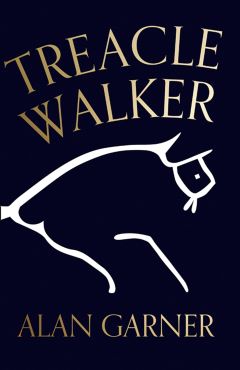I was happy to see The Trees and Small Things Like These make the Booker Prize shortlist but, alas, none of the others I read on the longlist made the cut. The winner will be announced October 17, and by then I hope to have read Treacle Walker and Oh William! among the finalists. Treacle Walker hasn’t been published in the U.S. Nevertheless, I found a copy in my library system by using the statewide library network. (I’m not sure why a county library would have a book published in England, but I’m glad they do.) If it doesn’t pop up in your library search, see if a reference librarian can offer assistance with the find. The Booker Prize is awarded to the best work of fiction written in the English language and published in the United Kingdom. It’s one of the most prestigious awards in literature given annually.

In full truth, I wouldn’t choose to read Treacle Walker if it weren’t for the Booker nomination. The novel embraces British folklore, legend, and myth, which I don’t know much about. Will I miss the messages and the meaning? Will I be lost without reference railings? The Booker Prize website says the story “brilliantly illuminates an introspective young mind trying to make sense of the world around him,” and that does interest me. The young protagonist Joe Coppock with a lazy eye, who lives alone, is visited by the rag-and-bones tradesman Treacle Walker. From the Times Literary Supplement:
Joe’s selection of a pot of strange ointment and his invitation to Treacle to come inside and sit in the chimney space with him sets off a chain of mysterious happenings that seem both inexplicable and inevitable.
Treacle Walker is often described as a single novel that embraces the concerns of the author’s well-published lifetime in both children and adult literature, worlds of magic and philosophic complexity. It’s another reason to read it, to see how that’s pulled off so eloquently in only 160 pages. Alan Garner is the oldest author ever to be shortlisted for the Prize.

I’ve come to believe you’re either a big fan of Elizabeth Strout’s novels or you’re firmly not a fan. Hard to believe there would even be a “not” camp; however, I was in it. I didn’t care for her first novel Amy and Isabelle, but back then, March 1999 (the date is written on the novel’s fly leaf under my signature), I had no idea Strout would rise to become the prolific, beloved author of today. I firmly ignored Abide With Me and Olive Kittredge (it won the Pulitzer Prize) and The Burgess Boys. And then, in 2017, I was asked to lead a book club discussion about Anything Is Possible, featuring Strout’s protagonist Lucy Barton. To prepare, I read Olive Kitteridge and My Name Is Lucy Barton and loved them both. (I shared this love with a friend, whom I then learned is firmly in the “not” camp.)
Oh William! tells the story of Lucy Barton’s long friendship with her ex-husband, William. He asks Lucy to join him on a trip to investigate a recently uncovered family secret, and the story takes off from there. The Booker Prize website says:
…Strout weaves a portrait, stunning in its subtlety, of a tender, complex, decades-long partnership.
Interesting to note: a fourth book in the Lucy Barton series, Lucy by the Sea, will be published next week.
Also on the 2022 Booker Prize shortlist: The Seven Moons of Maali Almeida by Shehan Karunatilaka and Glory by NoViolet Bulawayo. You can read more about the shortlist here.

Good morning Kassie, Thanks for you latest posting. I am firmly in the Elizabeth Strout fan club, but, like you, that wasn’t always the case. Years ago I read Olive Kittridge in a church group seeking moral lessons. My memories of reading that book were so bad that I threw it away. It was Oh William that put me firmly in the Elizabeth Strout camp. I adore the voice of the narrator and the meta aspects of the book. I now have a pile of Strout books on my dining room table, and I’m going through them one by one. I just finished Olive Kittridge yesterday afternoon. What a book! What a writer! (It was clearly the church group that poisoned it for me.) I will open Olive Again tonight.
Love your posts. Thanks again. M.
LikeLiked by 1 person
Hello Mary! There is definitely something about Strout’s style and viewpoint that is magical, and either a reader falls into it or doesn’t. Enjoy the pile! It will be fun for you to read My Name Is Lucy Barton and Anything Is Possible after Oh William.
LikeLiked by 1 person
I checked those two off my list weeks ago. The only thing that slightly bothered me, when I was reading Anything Is Possible, was that I couldn’t always remember the roles that the characters had played in My Name is Lucy Barton. I had to start keeping notes. But that was a very minor issue for me.
Olive Kitteridge Is such a fascinating character, so vulnerable. I loved that faint glimmer of self recognition in the last story. And her relationship with her son is, oh, so familiar. His language is a lot like Will’s.
“Magical” is exactly the right word. And now we have a new one to look forward to. Yay!
LikeLiked by 1 person